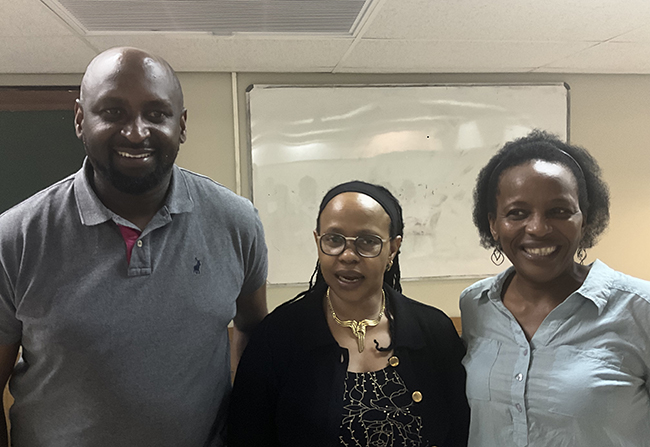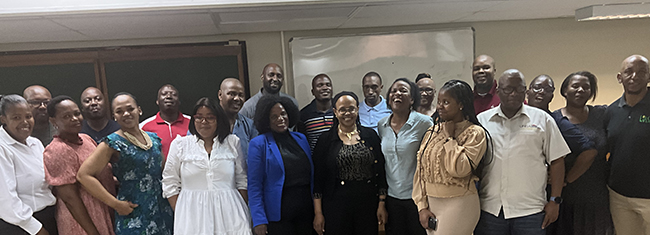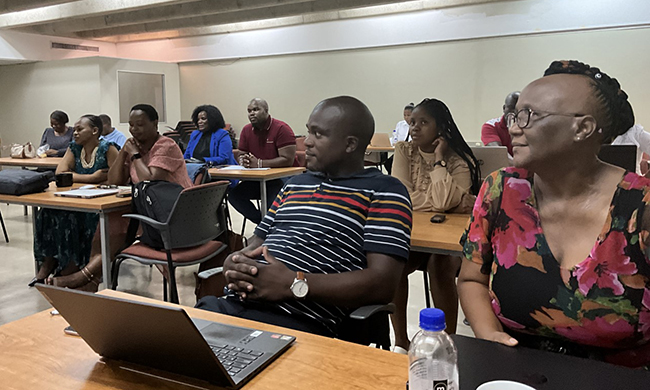News & Events
Directorate of Institutional Research held postgraduate workshop in KZN Region

Prof Tennyson Mgutshini, Acting Executive Director: College of Graduate Studies; Prof Thenjiwe Meyiwa, Vice-Principal: Research, Postgraduate Studies, Innovation and Commercialisation; Dr Joyce Myeza, Regional Director: KZN.
The Directorate of Institutional Research (DIR), which falls under the Strategy, Risk and Advisory Services Portfolio, recently held a face-to-face workshop on the Durban Campus in the KwaZulu-Natal (KZN) Region. The two-day seminar focused on giving attendees an overview of the services, the mandate and the framework of the DIR.
The first day of the workshop was dedicated to Unisa staff in the region who had already registered for postgraduate studies or were planning to embark on such studies. The engagement with staff was robust since many challenges and possible solutions were discussed to encourage staff not to be discouraged by obstacles such as deciding on a research topic, securing a supervisor and finalising summaries of their intended studies.
The Regional Director, Dr Joyce Myeza, addressed the attendees, saying that the masters and doctoral workshop was facilitated by senior university officials, namely, Professor Thenjiwe Meyiwa, the Vice-Principal: Research, Postgraduate Studies, Innovation and Commercialisation, and Professor Tennyson Mgutshini, the Acting Executive Director: College of Graduate Studies, adding that the workshop would be a huge confidence booster for staff to study further. She said that staff and students could utilise the illustrious academic expertise of the facilitators in the rather lonely journey of postgraduate studies, especially at the masters or doctoral level.

Attendees
Day two of the workshop was mainly dedicated to students, but staff who had missed the first day also had the chance to attend. Students identified and invited by the College of Graduate Studies participated in the workshop, and robust engagement occurred. One of the challenges raised by students was poor communication by university staff in general, especially the supervisors. The issue of turnaround time for feedback was also raised. Students indicated that waiting for feedback after submitting sections of their studies delayed their progress.
Mgutshini outlined the critical roadmap that masters and doctoral students should follow to start and finish their studies. Meyiwa encouraged students not to despair, saying they should not be discouraged by the unintended bumpy road they sometimes find themselves on during postgraduate studies. She cited several great stories and examples of good working relationships between students and supervisors. She said her portfolio was there to support, nurture and increase research capacity and quality at the university. Support systems have been introduced to ensure the postgraduate throughput rate improves at all levels. She said these systems are bearing fruit since the postgraduate throughput rate was better than it was in past years.

Attendees listening to presentations during the workshop
The university's focus on improved customer care and service delivery to students is a testament to its commitment to being student-centric and doing everything possible to provide the necessary support to help students succeed in their studies. In addition, the university's mission is to ensure that research is a university-wide enterprise driven by academics and professional and administrative staff.
*By Siyabonga Seme, Communications Manager, KwaZulu-Natal Region
Publish date: 2023/04/20
